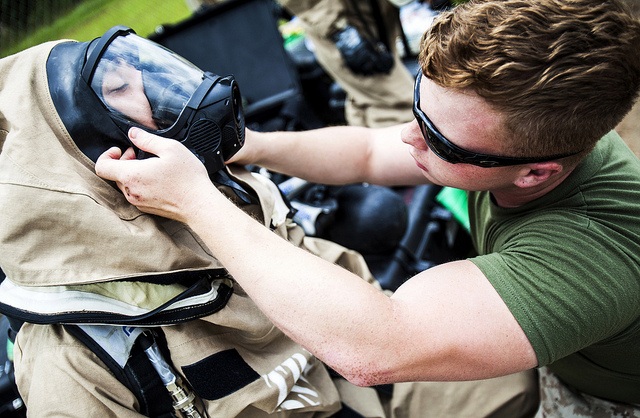Medical countermeasures: co-ordinated regional capability for global impact
Not having appropriate medical countermeasures (MCMs) to chemical, biological and radiological (CBR) threats, emerging infectious diseases or pandemics is the biggest risk to our health, economy and security. The current Ebola crisis demonstrates that in situations where there’s a limited amount of specific MCMs, Australia’s allies—traditionally, one of our main sources—won’t necessarily guarantee supply. It’s a timely reminder that Australia must be proactive in this area. A cornerstone for any response to a national health emergency will be ensuring our nation’s first responders (military, healthcare and emergency personnel) have an appropriate armamentarium to care for those affected.
MCMs include products such as therapeutics, vaccines, diagnostics and personal protective equipment. But the development of such products is highly specialised and their deployment is complex. Further, in preparing for potential emerging threats in our region, Australia must also consider availability of MCMs for a number of endemic diseases which aren’t considered a global MCM development priority.
In early recognition of the need to burden-share MCM development and secure its own situation, Australia became a signatory to the CBR Memorandum of Understanding (MoU) in 2006. The other CBR MoU signatories include the Defence departments of the United States, United Kingdom and Canada. The Medical Countermeasures Consortium (MCMC) is a working group under the CBR MoU and includes the Health Departments of each of those nations. The purpose of the MCMC is to address defence and public health medical countermeasure requirements across all levels of technological readiness—from early-phase research and development through to advanced development—to assist with all-hazard preparedness and response of the participant countries. The emphasis of the MCMC is on the collaborative development of MCM against threats affecting civilian and military populations.
Since 2012, the Australian Departments of Defence and Health, represented by the Defence Science and Technology Organisation (DSTO) and the Office of Health Protection (OHP), have been working with local biotechnology and medical-technology communities to identify, validate and develop national MCM-related capability and capacity. In 2013, DSTO commissioned a national audit of Australia’s MCM assets and product-development capabilities. A key recommendation from that audit was for the establishment of a public–private partnership to create a nexus between industry best-practice project/product development disciplines with relevant capabilities in government, universities, medical research institutes and the private sector. In September 2013, that proposed public–private partnership, Medical Countermeasure Products Australia (MCPA), was formed.
To date, the majority of achievements by MCPA have been accomplished through the small financial contributions of DSTO, the guidance of OHP and the in-kind efforts and goodwill of all MCPA stakeholders. The long-term aim of MCPA will be to develop leading-edge regulatory science and advanced development capabilities, and deploy those skills into activities that support keeping Australia secure. MCPA will also use its expertise to establish new drug development pathways and protocols globally, to accelerate the availability of new MCM products. By providing contemporary expertise in the evaluation, development, acquisition and deployment of MCMs, including drugs, vaccines, medical devices and diagnostics, MCPA will augment and enhance the current national preparedness and response plans by providing expert MCM product-development expertise to the Australian Health Protection Committee (AHPC) and the OHP .
MCPA has high visibility and support within the national and international MCM communities as it’s seen to be meshing a best-practice whole-of-government approach with contemporary corporate strategy. Other member countries of the MCMC have indicated they may replicate the MCPA business model within their own countries. A full business plan for MCPA has been developed and national decision makers have been briefed about the resources required for MCPA fully to realise its potential.
Australia is at a cross roads. It has a chance to co-ordinate its niche MCM capabilities and collaborate with the wider community to develop MCM products which address local, regional and international CBR threats, pandemics and emerging infectious diseases. Proactive leadership and a true partnership with the federal government will be the only way for MCPA to fulfil its objectives and deliver MCM product solutions and strategies for the benefit of civilian and military health. Australia has a real opportunity to contribute to the global MCM agenda.
Leigh Farrell is chairman of Steering Committee for Medical Countermeasure Products Australia and chief operating officer of d3 Medicine. Craig Rayner is chairman of Development Committee for Medical Countermeasure Products Australia and chief executive officer at d3 Medicine. Image courtesy of Flickr user Marines.
